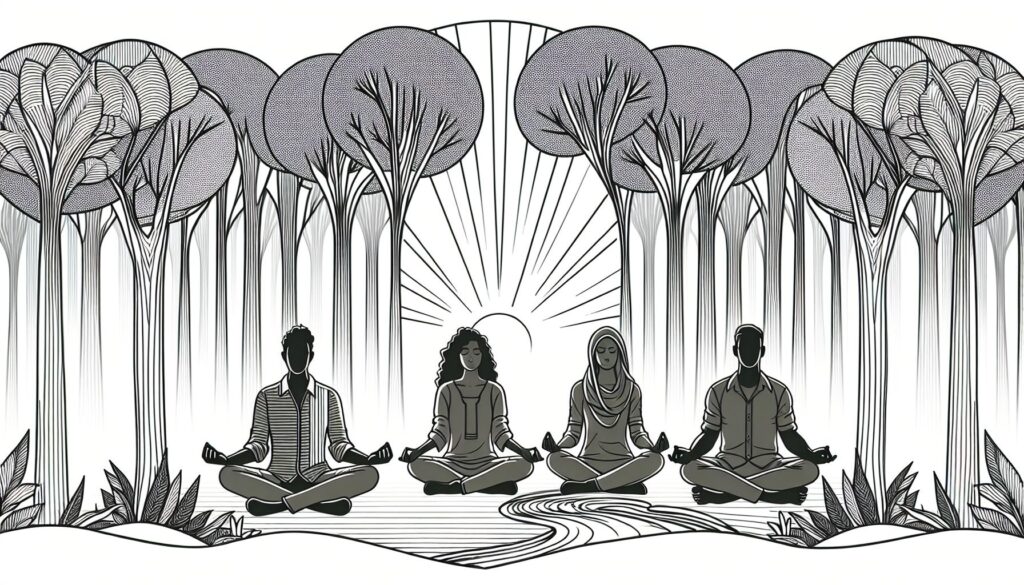In today’s fast-paced world, I’ve discovered a powerful tool that has transformed my life – mindfulness. By incorporating mindfulness practices into my daily routine, I’ve been able to cultivate resilience in the face of life’s challenges. It’s not about eliminating stress, but rather about how I respond to it.
Through mindfulness, I’ve learned to acknowledge my thoughts and emotions without judgment. This awareness has allowed me to navigate difficult situations with a sense of calm and clarity. Join me on this journey as I explore the profound impact of mindfulness on building resilience and thriving in the midst of adversity.
Understanding Mindfulness
When it comes to mindfulness, it’s all about being present in the moment. Mindfulness involves paying attention to your thoughts, feelings, bodily sensations, and the environment around you. By practicing mindfulness, I’ve discovered the power of being fully engaged in the present moment, without being overwhelmed by intrusive thoughts or worries about the future.
Mindfulness isn’t about blocking out negative emotions or living a life free of stress. Instead, it’s about acknowledging those feelings and learning to observe them without judgment. Through mindfulness practices, I’ve been able to cultivate a sense of calm and clarity, even in the midst of challenging situations.
One key aspect of mindfulness is mindful breathing. By focusing on my breath, I bring my attention back to the present moment, allowing me to let go of distractions and center myself. Mindful breathing has been a game-changer in my resilience-building journey, helping me stay grounded and respond to difficulties with a sense of equanimity.
I’ve also found that mindfulness meditation is a powerful tool for developing resilience. Through regular meditation sessions, I’ve trained my mind to be more aware of my thoughts and emotions, leading to greater emotional regulation and mental clarity. Mindfulness meditation has enabled me to approach challenges with a positive attitude and a heightened awareness of my inner resources.
Incorporating mindfulness into my daily routine has not only enhanced my ability to cope with adversity but has also brought a sense of balance and well-being to my life. By embracing mindfulness as a way of being, I’ve unlocked a powerful tool for building resilience and thriving in the face of life’s challenges.
The Role of Mindfulness in Cultivating Resilience
In my journey of building resilience through mindfulness, I’ve found that mindfulness practices play a crucial role in enhancing one’s ability to bounce back from challenges. By fostering a non-judgmental awareness of my thoughts and emotions, mindfulness has enabled me to approach difficulties with a sense of calm and clarity, rather than being overwhelmed by them.
Mindfulness techniques, such as mindful breathing and meditation, have equipped me with the tools to navigate uncertainties and setbacks with a positive outlook. Through consistent practice, I’ve developed a heightened emotional regulation that allows me to respond to adversity in a balanced and adaptive manner.
Moreover, mindfulness has instilled in me a greater sense of self-awareness and acceptance, which are essential components of resilience. By acknowledging my experiences without judgment, I’ve been able to cultivate a deep sense of inner strength that serves as a foundation for facing life’s challenges head-on.
Overall, the practice of mindfulness has been instrumental in nurturing resilience within me, empowering me to embrace setbacks as opportunities for growth and fostering a sustainable sense of well-being even in the face of adversity.
Practicing Mindfulness Techniques for Resilience
When it comes to building resilience through mindfulness, practicing mindfulness techniques is key. Here are some effective strategies that I find particularly beneficial:
- Mindful Breathing: Taking a few moments to focus on my breath helps me center myself and stay grounded during challenging times.
- Body Scan Meditation: This technique involves gradually shifting attention throughout my body, helping me release tension and become more attuned to physical sensations.
- Mindful Awareness of Emotions: Acknowledging and accepting my emotions without judgment allows me to respond to them in a calm and collected manner.
- Gratitude Practice: Cultivating a sense of gratitude by reflecting on things I’m thankful for has been instrumental in boosting my resilience.
- Mindful Movement: Engaging in activities like yoga or tai chi helps me stay present in the moment and connect with my body’s natural rhythms.
By incorporating these mindfulness techniques into my daily routine, I’ve noticed a significant improvement in my ability to navigate challenges with resilience and grace.
Benefits of Mindfulness for Building Resilience
Mindfulness practices offer a plethora of benefits when it comes to building resilience. Here are some key advantages:
- Improved Stress Management: Mindfulness helps me to manage stress more effectively by increasing self-awareness and promoting relaxation.
- Enhanced Emotional Regulation: Through mindfulness, I can better regulate my emotions and respond to challenges with composure and clarity.
- Heightened Focus and Concentration: Practicing mindfulness allows me to improve my focus and concentration, enabling me to stay present and engaged in the moment.
- Greater Self-Compassion: Mindfulness fosters a sense of self-compassion, helping me to be kinder to myself during difficult times.
- Reduced Anxiety and Depression: Engaging in mindfulness techniques has been shown to reduce anxiety and depression symptoms, promoting overall well-being.
- Enhanced Problem-Solving Abilities: By cultivating mindfulness, I can enhance my problem-solving skills and approach challenges with a clear and focused mindset.
Through consistent practice of mindfulness techniques, I can experience these benefits firsthand and cultivate a resilient mindset to navigate life’s ups and downs with strength and grace.
Mindfulness as a Tool for Thriving Amid Challenges
Embracing mindfulness has been a game-changer in how I approach challenges. Practicing mindfulness isn’t just about relaxing; it equips me with the mental strength needed to face adversity head-on. By being present in the moment, I can better understand my emotions and thoughts, allowing me to respond thoughtfully rather than react impulsively.
Mindfulness techniques have given me a heightened sense of self-awareness. When faced with obstacles, I find it easier to maintain a calm and composed demeanor. This sense of clarity enables me to make better decisions and take appropriate actions, even in high-pressure situations.
Furthermore, engaging in mindfulness practices has enhanced my problem-solving skills. Rather than getting overwhelmed by the complexities of a challenge, I’m able to break it down into manageable parts, facilitating a more systematic and effective approach to finding solutions.
In essence, mindfulness serves as a powerful tool that empowers me to not only survive but thrive amid life’s inevitable challenges. By honing my mindfulness practice, I’ve cultivated a resilient mindset that enables me to adapt, grow, and flourish in the face of adversity.
Key Takeaways
- Mindfulness is about being present in the moment, acknowledging thoughts and emotions without judgment, and cultivating a sense of calm and clarity.
- Mindful breathing and meditation are powerful techniques that can enhance emotional regulation and mental clarity, aiding in building resilience.
- Regular mindfulness practices help in developing self-awareness, acceptance, and inner strength, essential components of resilience.
- Incorporating mindfulness techniques like body scan meditation, gratitude practice, and mindful movement into daily routine can significantly improve resilience.
- Benefits of mindfulness for resilience include improved stress management, enhanced emotional regulation, heightened focus, greater self-compassion, reduced anxiety, and depression, and enhanced problem-solving abilities.
- Mindfulness equips individuals with the mental strength needed to face challenges, maintain composure, make thoughtful decisions, and thrive amidst adversity.
Conclusion
In building resilience through mindfulness, I’ve highlighted the transformative power of cultivating self-awareness and maintaining a composed mindset. By practicing mindfulness, individuals can effectively tackle challenges, enhance problem-solving abilities, and navigate life’s hurdles with strength and grace. Embracing mindfulness techniques empowers me to flourish in adversity, fostering a resilient mindset that enables growth and adaptation. Through mindfulness, I’ve discovered the key to thriving in the face of obstacles, not just surviving.



